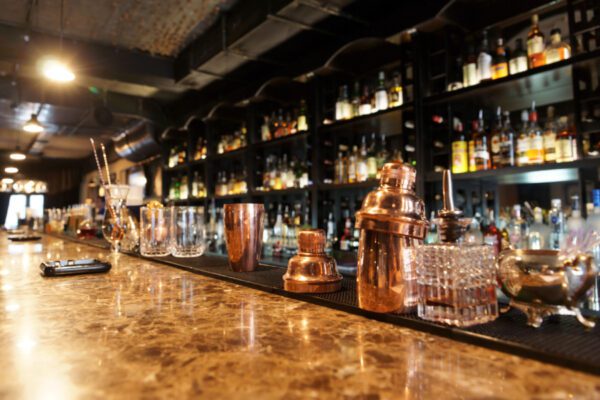It will help if you protect your business from potential risks and liabilities when operating a bar. This is where bar insurance comes into play. Bar insurance provides coverage tailored to the unique needs of bars, pubs, taverns, and similar establishments. From liquor liability to property protection, bar insurance offers comprehensive coverage to safeguard your business, employees, and customers. Understanding the key aspects of bar insurance and obtaining the right coverage is crucial for ensuring smooth operation and long-term success.
What is Bar Insurance?
Bar insurance is a type of insurance coverage designed to protect the unique risks and liabilities associated with operating a bar or similar establishment. It typically includes a range of coverage options tailored to the needs of bars, such as general liability insurance to cover bodily injury or property damage claims, liquor liability insurance to address incidents arising from alcohol service, property insurance to protect physical assets, and business interruption insurance to provide coverage for lost income during closures. Additional coverage options may include workers’ compensation, cyber liability, and crime insurance. Hiring a licensed bartender is crucial as they bring expertise in responsible alcohol service, ensuring compliance with legal and safety requirements. Licensed bartenders can minimize liability risks, handle difficult situations effectively, and contribute to maintaining a safe and successful environment within the bar.
Why do bars require business insurance?
Bars require business insurance for several reasons:
- Liability protection: Bars are prone to accidents and injuries, and business insurance provides liability coverage against lawsuits and claims from customers or third parties.
- Property protection: Bars have valuable assets, and business insurance covers damage or loss caused by fire, vandalism, theft, or natural disasters.
- Liquor liability: Bars face risks associated with alcohol consumption, and liquor liability insurance protects against claims arising from incidents caused by intoxicated patrons or violations of alcohol-serving regulations.
- Business interruption: Insurance can provide coverage for lost income and ongoing expenses during unexpected closures, helping bars stay financially stable.
- Employee protection: Workers’ compensation coverage in restaurant insurance protects employees from work-related injuries or illnesses.
Restaurant insurance offers bars comprehensive protection, allowing them to operate responsibly and manage risks associated with their industry.
What types of insurance do bars need?
Bars typically require several types of insurance to protect their business adequately. The specific insurance needs may vary depending on the bar’s size, location, and applicable laws and regulations. Here are some common types of insurance coverage that bars typically need:
General Liability Insurance
General liability insurance is essential for bars as it covers bodily injury, property damage, and personal injury claims. It protects the bar owner from lawsuits and claims filed by customers or third parties who may have suffered harm or property damage while on the premises.
Liquor Liability Insurance
Liquor liability insurance is specifically designed for businesses that serve alcohol. It covers claims arising from incidents caused by intoxicated customers, such as accidents, injuries, or property damage. This type of insurance is crucial for bars to protect themselves from alcohol-related incidents’ potential legal and financial consequences.
Property Insurance
Property insurance covers the physical assets of the bar, including the building (if owned), furniture, fixtures, equipment, inventory, and supplies. It provides coverage against damages or losses caused by fire, theft, vandalism, or natural disasters. Property insurance helps bars recover and rebuild in case of unexpected incidents.
Business Interruption Insurance
Business interruption insurance is essential for bars as it covers lost income and ongoing expenses in the event of a temporary closure due to unforeseen circumstances, such as a fire or natural disaster. This coverage helps bars meet financial obligations during the closure period until they can reopen.
Workers’ Compensation Insurance
Bars with employees are typically required to carry workers’ compensation insurance. It provides benefits to employees who suffer work-related injuries or illnesses. Workers’ compensation coverage helps ensure that employees receive medical care and wage replacement while protecting the bar from potential legal liabilities resulting from workplace accidents.
Employment Practices Liability Insurance (EPLI)
EPLI insurance protects bars against claims made by employees regarding employment-related issues such as discrimination, harassment, wrongful termination, or other workplace violations.
Cyber Liability Insurance
In an increasingly digital world, bars may store sensitive customer information and conduct transactions electronically. Cyber liability insurance protects against data breaches, cyberattacks, or other cyber incidents that could result in financial losses or damage to the bar’s reputation.
How much does bar insurance cost?
For a small to medium-sized bar with annual revenues of $500,000, the following estimated premium ranges can provide a rough idea:
- General Liability Insurance: The cost can range from $500 to $2,500 per year, depending on the bar’s size, occupancy capacity, and previous claims history.
- Liquor Liability Insurance: This coverage is typically more expensive due to the higher risks of serving alcohol. The premiums can range from $2,000 to $10,000 annually, depending on the bar’s alcohol sales volume, history of alcohol-related incidents, and location.
- Property Insurance: The cost depends on factors such as the building’s value, location, security measures in place, and the value of contents. The premiums can range from $1,500 to $5,000 per year for a bar with average property values.
- Business Interruption Insurance: This coverage is typically an additional cost on top of property insurance. The premium can range from 10% to 30% of the property insurance cost. Therefore, for a property insurance premium of $2,000, the business interruption insurance cost could be around $200 to $600 per year.
- Workers’ Compensation Insurance: The cost varies based on the number of employees, job roles, and the bar’s claims history. As a general estimate, the premiums can range from $2,000 to $10,000 or more per year, depending on these factors.
It’s important to remember that these estimates are general ranges and may not accurately reflect the specific costs for every bar. It’s recommended to consult with insurance providers or brokers specializing in bar insurance to obtain accurate quotes tailored to the bar’s unique characteristics and needs.
How can I obtain insurance for my bar?
To obtain insurance for your bar, follow these steps:
- Research and identify insurance providers or brokers specializing in bar or hospitality industry insurance.
- Contact them to discuss your specific needs and obtain quotes.
- Provide detailed information about your bar, including size, location, services, annual revenue, and unique risks.
- The insurance provider will assess your requirements and offer policy options tailored to your needs.
- Review the coverage, terms, and costs of each policy carefully.
- Complete the necessary application forms and submit any required documentation or information.
- Pay the premiums as outlined in the policy agreement.
- Obtain a copy of the insurance policy and keep relevant contact information.
- Regularly review and update your insurance coverage to ensure it remains adequate as your business evolves.
Bar Insurance Coverage
Bar insurance coverage typically includes several key components to protect the business adequately. While the specific coverage may vary depending on the bar’s size, location, and particular needs, here are some common types of insurance coverage typically included in a comprehensive bar insurance policy:
General Liability Insurance
This coverage protects against claims of bodily injury, property damage, or personal injury on the bar’s premises. It covers legal expenses, medical costs, and potential settlements or judgments resulting from these claims.
Liquor Liability Insurance
Liquor liability insurance is crucial for bars that serve alcohol. It covers claims caused by intoxicated patrons, such as accidents, injuries, or property damage. This coverage helps protect the bar from the potential legal and financial consequences of alcohol-related incidents.
Property Insurance
Property insurance covers the physical assets of the bar, including the building (if owned), furniture, fixtures, equipment, inventory, and supplies. It protects against damages or losses caused by fire, theft, vandalism, or natural disasters.
Business Interruption Insurance
Business interruption insurance covers lost income and ongoing expenses if the bar temporarily closes due to unforeseen events, such as fire, natural disasters, or other covered perils. It helps the bar meet financial obligations during the closure period until it can reopen.
Workers’ Compensation Insurance
Bars with employees are typically required to carry workers’ compensation insurance. It helps cover medical expenses, lost wages, and rehabilitation costs while protecting the bar from potential legal liabilities from workplace accidents.
Cyber Liability Insurance
Cyber liability insurance has become essential as bars increasingly rely on technology and store customer data electronically. This coverage protects against data breaches, cyberattacks, or other cyber incidents that could result in financial losses or damage to the bar’s reputation.
Additional coverage options may include:
- Crime Insurance: Protects against theft, employee dishonesty, or other criminal acts within the bar.
- Employment Practices Liability Insurance (EPLI): Provides coverage for claims related to employment practices issues, such as discrimination, harassment, or wrongful termination.
- Umbrella Insurance: Offers additional liability coverage beyond the limits of underlying insurance policies.
What coverage does tavern insurance offer?
Tavern insurance offers comprehensive coverage to protect against the specific risks associated with operating a tavern. This coverage typically includes general liability insurance for bodily injury and property damage claims, liquor liability insurance to address incidents related to alcohol service, property insurance to safeguard physical assets, and business interruption insurance for lost income during closures. Hiring a licensed bartender is essential as they bring professionalism, knowledge of responsible alcohol service, and the ability to manage the bar effectively while maintaining a safe environment. They can help minimize liability risks, ensure compliance with licensing laws, and handle difficult situations, reducing the potential for legal issues and enhancing the overall safety and success of the tavern.
What establishments need tavern insurance?
Tavern insurance is typically necessary for establishments that serve alcoholic beverages and provide a social environment for patrons. While the specific terminology may vary, the following types of establishments generally require tavern insurance:
- Taverns: Traditional taverns that primarily serve alcoholic beverages and may also offer food or entertainment.
- Bars: Bars that focus on serving alcoholic beverages often provide a social gathering space.
- Pubs: Establishments that offer alcoholic beverages, food, and a relaxed social atmosphere.
- Nightclubs: Venues that provide entertainment, such as live music, dancing, and alcoholic beverages.
- Sports Bars: Bars catering to sports enthusiasts, featuring televisions broadcasting sports events and serving alcoholic beverages.
- Breweries and Brewpubs: Facilities that produce and serve their craft beer on-site.
- Wine Bars: Establishments specializing in serving a variety of wines.
- Cocktail Lounges: Upscale bars focusing on craft cocktails and providing a more sophisticated atmosphere.
- Social Clubs: Membership-based establishments that offer a social gathering place for members, often serving alcoholic beverages.
It’s important to note that these establishments’ specific licensing and regulatory requirements may vary by jurisdiction, and the exact terminology used to describe them can differ.
Material posted on this website is for informational purposes only and does not constitute a legal opinion or medical advice. Contact your legal representative or medical professional for information specific to your legal or medical needs.




